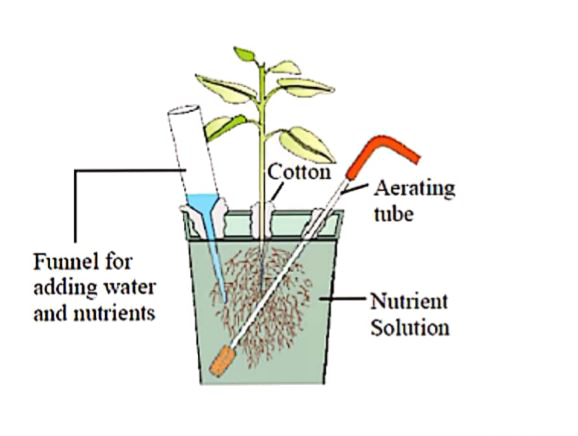Hydroponics has been successfully employed as technique for commercial production of all except –
Apple
Tomato
Lettuce
Seedless Cucumber
The correct Answer is:A
Step-by-Step Solution:
1. Understanding Hydroponics: Hydroponics is a method of growing plants without soil, using a mineral nutrient solution in water. This technique allows plants to absorb nutrients directly from the water.
2. Advantages of Hydroponics: Hydroponics has several advantages, including:
- It can be used in harsh conditions where soil quality is poor.
- It helps avoid soil-borne pathogens since there is no soil involved.
- It conserves water, as the water usage is more controlled compared to traditional soil farming.
3. Identifying Suitable Crops: Hydroponics is commonly used for various crops, including:
- Tomatoes
- Lettuce
- Seedless cucumbers
- Strawberries
- Peppers
4. Analyzing the Options: The question asks which of the following crops hydroponics has not been successfully employed for commercial production:
- A) Apple
- B) Tomato
- C) Lettuce
- D) Seedless cucumber
5. Evaluating Each Option:
- Tomato: Hydroponics is successfully used for tomatoes.
- Lettuce: Hydroponics is successfully used for lettuce.
- Seedless cucumber: Hydroponics is successfully used for seedless cucumbers.
- Apple: Hydroponics is not commonly used for apple production due to the difficulty in growing apple trees without soil.
6. Conclusion: The correct answer is A) Apple, as hydroponics has not been successfully employed for the commercial production of apples.
---
- It can be used in harsh conditions where soil quality is poor.
- It helps avoid soil-borne pathogens since there is no soil involved.
- It conserves water, as the water usage is more controlled compared to traditional soil farming.
- Tomatoes
- Lettuce
- Seedless cucumbers
- Strawberries
- Peppers
- A) Apple
- B) Tomato
- C) Lettuce
- D) Seedless cucumber
- Tomato: Hydroponics is successfully used for tomatoes.
- Lettuce: Hydroponics is successfully used for lettuce.
- Seedless cucumber: Hydroponics is successfully used for seedless cucumbers.
- Apple: Hydroponics is not commonly used for apple production due to the difficulty in growing apple trees without soil.
টপার এই প্রশ্নগুলো সমাধান করেছে
সম্পর্কিত প্রশ্ন
Read the following statements and choose the correct one from the options given below.
(i) Hydroponics is the practice of growing plants in nutrient - enriched water , without soil.
(ii) Hydroponics has been successfully employed as a technique for the commercial production of vegetables such as tomato.
(iii) Hydroponics methods require purified water and non - mineral nutrient salts.
(iv) The nutrient solutions should not be aerated to obtain optimum growth.
(a) (i) and (ii) only
(b) (i) and (ii) only
(c) (i) , (iii) and (iv) only
(d) (i) , (ii) , (iii) and (iv)
View SolutionBelow diagram showing a technique for the culture of plants. This technique has been successfully employed for the production of which of the following?

View Solution
জ্ঞান পরীক্ষা করুন
The technique of hydroponics is bieng employed for the commercial production of vegetables like
AtomatoBcucumberClettuceDall of theseAssertion: The technique of growing plants in a nutrient solution is known as hydroponics
Reason: Hydroponics is used for commercial production of vegetables such as tomato, seedless cucumber and lettuce.AIf both assertio and reason are true and reason is the correct explanation of assertionBif both assertion and reason are true but reason is not the correct explanation of assertionCif assertion is true but reason is falseDif both assertion and reason are false
Name three plants for which hydroponics can be employed for their commercial production
View SolutionHydroponics have been shown to be a successful technique for growing of plants. Yet most of the crops are still grown on land . Why ?
View SolutionHydroponics have been shown to be a successful technique for growing of plants. Yet most of the crops are still grown on land. Why?
View SolutionGenetically engineered bacteria have been used in the commercial production of
View SolutionMonomers as end products are produced by the action of all, except
View SolutionGibberellic acid has been successfully employed to induce flowering
(a) In short day plants under long day conditions
(b) In long day plants under short day conditions
(c) In some short day and long day plants
(d) In neither short day nor long day plants
View Solution

